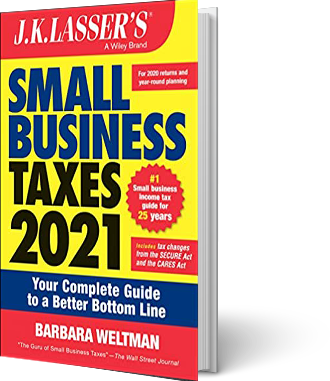 For more than 25 years, I’m proud to say my tax book for small businesses has been the go-to-tax-guide for owners and their tax advisors. The J.K. Lasser’s Small Business Taxes 2021 edition for preparing 2020 returns as well as tax planning for 2021 has been updated to incorporate COVID-19-related and other new laws, court decisions, and IRS pronouncements. As has been my practice, I’ve written my own book review to explain the purpose of the book, what’s new, and what’s ahead.
For more than 25 years, I’m proud to say my tax book for small businesses has been the go-to-tax-guide for owners and their tax advisors. The J.K. Lasser’s Small Business Taxes 2021 edition for preparing 2020 returns as well as tax planning for 2021 has been updated to incorporate COVID-19-related and other new laws, court decisions, and IRS pronouncements. As has been my practice, I’ve written my own book review to explain the purpose of the book, what’s new, and what’s ahead.
Why small business owners need a tax book
If you’re like the vast majority of small business owners (nearly 90%), you use a CPA or other tax pro to prepare your business returns. You may even work with tax experts on specific matters, such as succession planning, inventory management, and payroll.
However, it’s my belief that all small business owners need to be informed about taxes and can’t rely solely on tax professionals.
The reason: Owners, not their accountants or software, run their businesses and make decisions impacted by taxes on a daily basis.
- Should you hire employees or engage independent contractors?
- What benefits are you required to provide to employees (such as coronavirus paid sick leave and family leave)?
- Should you buy or lease equipment?
- What type of financing should be used to start or grow a business?
- Who should own the truck—the owner or the company?
- What are the consequences of offering your employees a particular type of health care arrangement, or opting not to offer any medical coverage?
- What are the tax implications of various employee benefit plans and how do you offer them without messing up and incurring penalties?
You may get information from your tax pro that’s helpful to your business. But you can also educate yourself by reading my book—without incurring professional fees. In the least, you’ll be able to ask your CPA or other tax advisor the right questions to protect your business and cut your tax bill.
What the book includes
In addition to reflecting all cost-of-living adjustments to various limitations and eligibility requirements for tax breaks, the 2021 edition covers the tax changes from the SECURE Act, the Families First Coronavirus Relief Act, and the CARES Act. It includes COVID-19-related refund opportunities to improve your cash flow and guidance on the tax implications of PPP loans.
Looking ahead
The tax law doesn’t stand still. There are always new laws, cases, and rulings that arise after the publication of the book. When this book was prepared, the IRS hadn’t yet provided guidance on deducting expenses covered by PPP loans under different scenarios (it has now). And Congress was considering another stimulus measure and an appropriations bill, both of which could contain tax changes for 2020. What’s more, there are many business-related tax rules set to expire at the end of 2020 that could be extended. For this reason, there’s an online supplement to explain last-minute developments, including new IRS guidance on handing expenses if you obtained a PPP loan, that may impact tax return preparation for 2020 and tax planning for 2021 and beyond. The supplement is free and should be posted early February 2021 on my website.
Interacting with readers
Each year I receive emails from readers asking questions, suggesting future topics to include, and sometimes pointing out errors. I’m very grateful for these communications, which helps me continually improve the book and provide valuable assistance to small business owners. If you have thoughts on the book, please email me at barbara @ BigIdeasForSmallBusiness .com.


